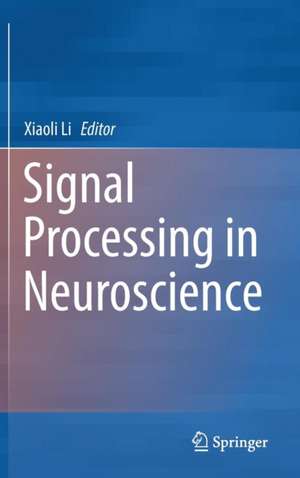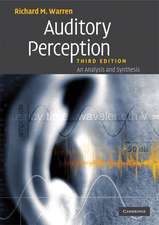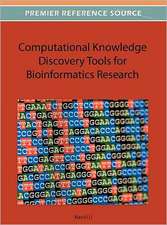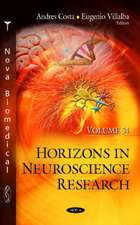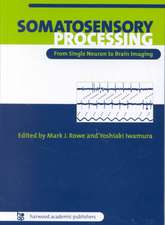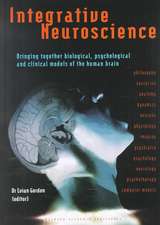Signal Processing in Neuroscience
Editat de Xiaoli Lien Limba Engleză Hardback – 6 sep 2016
Neuronal Signal Processing is a comparatively new field in computer sciences and neuroscience, and is rapidly establishing itself as an important tool, one that offers an ideal opportunity to forge stronger links between experimentalists and computer scientists. This new signal-processing tool can be used in conjunction with existing computational tools to analyse neural activity, which is monitored through different sensors such as spike trains, local filed potentials and EEG. The analysis of neural activity can yield vital insights into the function of the brain. This book highlights the contribution of signal processing in the area of computational neuroscience by providing a forum for researchers in this field to share their experiences to date.
| Toate formatele și edițiile | Preț | Express |
|---|---|---|
| Paperback (1) | 1107.88 lei 6-8 săpt. | |
| Springer Nature Singapore – 20 apr 2018 | 1107.88 lei 6-8 săpt. | |
| Hardback (1) | 1113.89 lei 6-8 săpt. | |
| Springer Nature Singapore – 6 sep 2016 | 1113.89 lei 6-8 săpt. |
Preț: 1113.89 lei
Preț vechi: 1358.41 lei
-18% Nou
Puncte Express: 1671
Preț estimativ în valută:
213.15€ • 227.92$ • 177.71£
213.15€ • 227.92$ • 177.71£
Carte tipărită la comandă
Livrare economică 18 aprilie-02 mai
Preluare comenzi: 021 569.72.76
Specificații
ISBN-13: 9789811018213
ISBN-10: 9811018219
Pagini: 469
Ilustrații: VI, 288 p. 106 illus., 87 illus. in color.
Dimensiuni: 155 x 235 x 18 mm
Greutate: 0.59 kg
Ediția:1st ed. 2016
Editura: Springer Nature Singapore
Colecția Springer
Locul publicării:Singapore, Singapore
ISBN-10: 9811018219
Pagini: 469
Ilustrații: VI, 288 p. 106 illus., 87 illus. in color.
Dimensiuni: 155 x 235 x 18 mm
Greutate: 0.59 kg
Ediția:1st ed. 2016
Editura: Springer Nature Singapore
Colecția Springer
Locul publicării:Singapore, Singapore
Cuprins
Brief history and development of electrophysiological recording techniques in neuroscience.- Adaptive Spike Sorting with a Gaussian Mixture Model.- Causality of Spike Trains Based on Entropy.- Quantification of Spike-LFP Synchronization.- Artifact removal in EEG recordings.- Order Time Series Analysis of Neural Signals.- Dynamical Similarity Analysis of EEG Recordings.- Entropy Measures in Neural Signals.- Synchronization Measures in EEG Signals.- Estimating Coupling Direction between Neuronal Populations.- The comodulation measure of neuronal oscillations.- Multivariate EEG synchronization strength measures.- Cross-Frequency Coupling in Neural Oscillations.- Nonnegative Matrix and Tensor Decomposition of EEG.
Notă biografică
Dr. Xiaoli Li is a Professor from State Key Laboratory of Cognitive Neuroscience and Learning, Beijing Normal University. He is the committee member of Medical Neural Engineering Branch of Chinese Society of Biomedical Engineering. He serves as the editor for the journal “International Journal of Tomography & Stimulation” and “International Journal of Applied Mathematics & Statistics”. Prof. Li’s research interests include neural engineering, bio-signal processing and intelligent monitoring. He has published more than 100 research articles on different international journals.
Textul de pe ultima copertă
This book reviews cutting-edge developments in neural signalling processing (NSP), systematically introducing readers to various models and methods in the context of NSP.
Neuronal Signal Processing is a comparatively new field in computer sciences and neuroscience, and is rapidly establishing itself as an important tool, one that offers an ideal opportunity to forge stronger links between experimentalists and computer scientists. This new signal-processing tool can be used in conjunction with existing computational tools to analyse neural activity, which is monitored through different sensors such as spike trains, local filed potentials and EEG. The analysis of neural activity can yield vital insights into the function of the brain. This book highlights the contribution of signal processing in the area of computational neuroscience by providing a forum for researchers in this field to share their experiences to date.
Neuronal Signal Processing is a comparatively new field in computer sciences and neuroscience, and is rapidly establishing itself as an important tool, one that offers an ideal opportunity to forge stronger links between experimentalists and computer scientists. This new signal-processing tool can be used in conjunction with existing computational tools to analyse neural activity, which is monitored through different sensors such as spike trains, local filed potentials and EEG. The analysis of neural activity can yield vital insights into the function of the brain. This book highlights the contribution of signal processing in the area of computational neuroscience by providing a forum for researchers in this field to share their experiences to date.
Caracteristici
Highlighting the contribution of signal processing in the area of computational neuroscience
Introducing the cutting-edge development in neural signaling processing
Written by experts in this field
Introducing the cutting-edge development in neural signaling processing
Written by experts in this field
